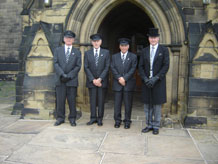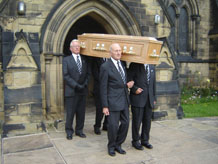
PLEASE CLICK MEMORY GIVING LOGO ABOVE FOR CURRENT FUNERALS & MAKING ONLINE DONATIONS
FLORAL TRIBUTES INTERFLORA

COPING WITH YOUR GRIEFWhen someone dies the feelings and thoughts of those left can be varied and wide-ranging. At the start there are many practicalities to deal with and after funerals many people are still faced with bewildering feelings that are difficult to come to terms with. |
|
||
|
GRIEF There is no right or wrong way to grieve for the loss of a loved one. After the initial shock and disbelief, other aspects of grief may include problems sleeping, physical and mental exhaustion, being forgetful, not being able to concentrate, feeling irritable, feeling anxious and panicky as well as many more. People sometimes then move on to feelings of anger, guilt and great sadness and will have good and bad days as time passes. HOW CAN COUNSELLING HELP Dealing with grief often involves a lot of time spent thinking and talking about the person who has died and some people feel that they need more than simply the support of family and friends to be able to do this in a beneficial way. Many people you know may feel uncomfortable talking about death and may be too worried about upsetting you. This is where counselling can help - a counsellor will listen and support you while at the same time helping you find your own ways forward. A counsellor will not judge you or tell you what you should or should not do, but instead will work with you to explore the thoughts and feelings that are most important to you. Counselling can also help you to find ways that are right for you to remember the person who has died, both soon after death as well as in the longer term.
|









